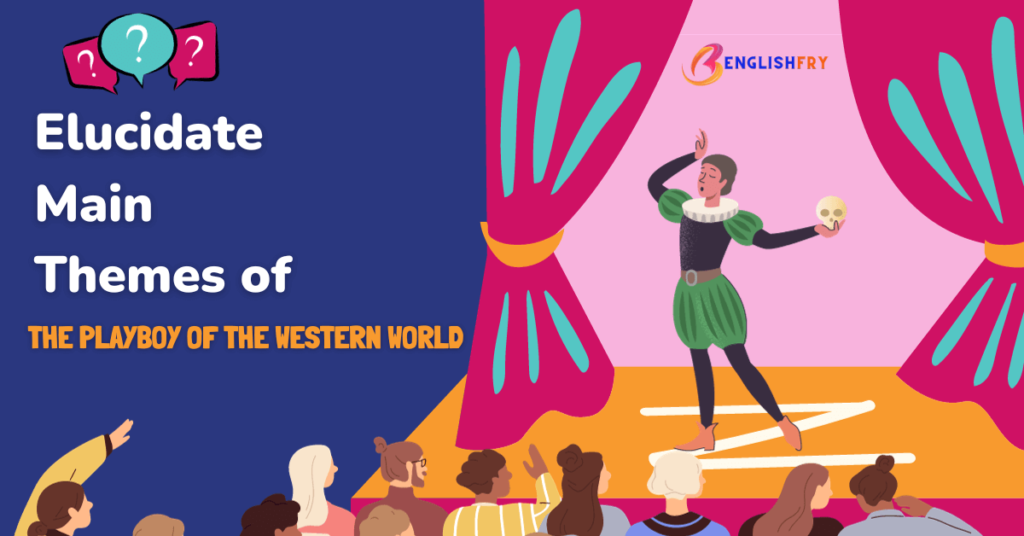John Millington Synge (1871-1909) is considered because the best dramatist of the Irish Literary revival. Along with W.B.Yeats and Lady Gregory he made the Abbey Theatre of Dublin a well-known centre of dramatic activities. He wrote numerous performs- The Aran Islands, The Shadow of Glen, Riders to the Sea, The Tinker’s Wedding, The Playboy of the Western World, The Well of the Saints and Deirdre of Sorrows. These plays offer evidence of his versatility and feature won and preserved for him a permanent vicinity most of the tremendous names within the British drama.
The Playboy of the Western World, a distinctly controversial play exposed the middle magnificence target market to a distinct portrayal of Irish geographical region existence rather than the traditional idyllic image they were familiar with. The play has been looked at variously from the point of view of its genre, its topics and its primary characters.The main themes in the play are:-
Theme of Opposition: At that point Ireland turned into below the manipulate of England. The people of the imperialist country had been fighting for freedom. The liberties of the people had been being crushed and had been mercilessly exploited. The result was that the general masses appeared the landlords, magistrates, policemen and judges as their enemies. Hence, every person who broke the law have become hero. That is why human beings of Mayo have a propensity to defend all criminals. Christy involves Mayo and tells them that he had killed his father with a single stoke of spade. Instead of treating it as a despicable act and handing him over to the police, he’s received warmly and handled as a hero. They appeared a self-confessed assassin, one who adversarial the law as a courageous and reliable man.
Theme of Patricide: Another subject of the play is patricide. This is linked with the concept of boom of persona. Christy has built up his persona (attained adulthood and manhood) via symbolically killing his tyrannical father. Though patricide was the most dreadful of sins to the ancient Greeks but in the gift play the situation is dealt with with comedian irony, certainly with comedian reversal of values and is provided as a metaphor of emancipation and fulfillment. Christy commits murders of his father and is prepared to kill him the 1/3 time. The first time he hit him with spade and idea become killed while his father tried to force him to marry a wealthy old widow. The 2d time he moves him to win again Pegeen’s respect.
However, the leader interest of the play appears to be in the increasing awareness of Christy beneath the impact of the adulation of Pegeen and different Mayo ladies and men. Instead of handing him to Police, people regard him as a brave hero. Pegeen admires him as person who has performed a few glorious act. The maximum actual reward is the growth of his persona and his poetic eloquence that accompanies it. As towards his this success, Shawn laments that he has no father to kill. Widow Quin feels inferior because she has only killed her husband and no longer father. At the cease, Christy leaves as a mature and self-assured boy quite extraordinary from the worried runaway boy.
Theme of Fantasy as opposed to Reality: The play is about myth. It indicates the energy of myth to create a fact out of dream or illusion. The growth of Christy’s recognition is followed thru a lie and grows to heroic proportions at each telling. The humans of Mayo welcome his myth as long as it remains distant, a ‘gallous-story’ beautifully advised but turns into disgustful while it comes too close for consolation and becomes a grimy deed. Christy’s exaggeration and people of his listeners offer a first rate deal of amusing, but Synge sees to it that in his handling of the subject versus reality by no means receives out of hand. Whenever Christy soars too high at the wings of his imagination, Synge brings him returned to earth. For example, when Christy is boasting about his bravery to Pegeen, a knock at the door sends him cowering to her. Similar types of times can be observed in the course of the play. Therefore, whilst fantasy turns into a fact it transforms the individual.
Theme of Role-gambling: One of the issues inside the play is likewise about position-playing. This is critical for Christy for his survival, however later that turns into a means to self-discovery. He is supposed to be a man of phrases instead of deeds but proves to be a man of deeds at the cease. Christy is certainly a naïve braggart who does now not lie grossly and whose fantasies are more a sign of his very own growing vanity. This brings us to the popularity that Christy’s position-gambling proves to be educative and leads to self-discovery; it effects in the introduction of a brand new persona.
Therefore, each topic is intimately linked with the opposite and only together do they come close to present a real image of the play.







